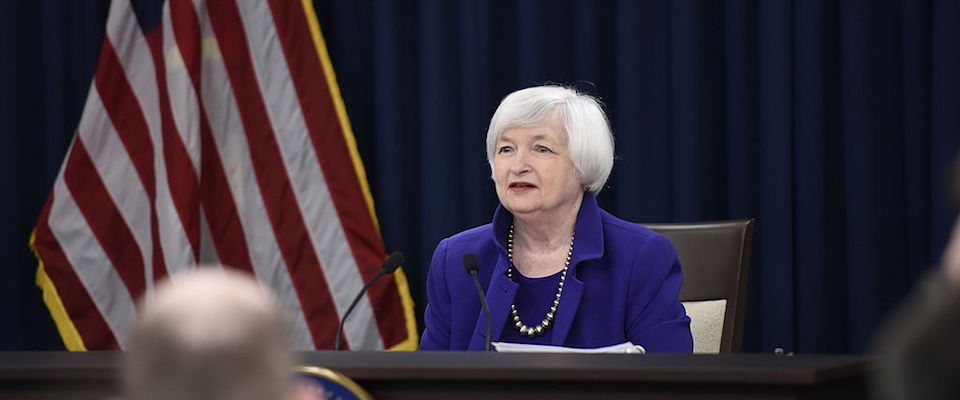Next to headlines on the ongoing government shutdown, the prospect of a default on the national debt, and the spike in the price of short-term federal IOUs which, according to one wonk “ should terrify you,” the news that Berkeley’s own Janet Yellen was tapped to chair the Federal Reserve might have been the least exciting economic news you’ll read all week.
For many a Fed watcher, yesterday’s news that President Obama asked professor emeritus Yellen to step up from her position as Vice-Chairperson of the country’s central bank to replace Ben Bernanke in the top spot, comes as a mere formalization of the inevitable. Since the Obama’s preferred candidate, Lawrence Summers, withdrew his name from consideration last month (to the delight of progressives across the country), Yellen has been the presumed front runner. According to Slate’s Matt Yglesias, Yellin is “the exact right mix of ‘is a Democrat’ and ‘is not a Democratic Party operative.’”
Now that it’s official, Yellen’s nomination may be deemed newsworthy (even historic) for the two ways in which the former San Francisco Fed branch president stands apart from her predecessors.
First, Yellin, if confirmed, will be the first Democrat to hold the position since Paul Volker stepped down in 1987. Second, and much more noteworthy, she would be the Fed’s first chairwoman of the Federal Reserve. That’s a glass ceiling that has remained more or less unbroken the world over. No major economy has ever abided a woman targeting its interest rates.
But in all the ways that count in central banking, says Berkeley economist David Romer, Yellen’s promotion will be no major departure—her political affiliation and gender notwithstanding.
“It definitely represents a continuation,” Romer said in an emailed response. Romer, who, along with his wife, Christina Romer, was one of 505 economists to co-sign an open letter last month to President Obama in support of Yellen, says that he would expect a Yellen-led Fed to very much resemble Bernanke’s.
“In light of the fact that she helped design [current] policies, I think it’s unlikely that she would change them rapidly,” he says.
While conservatives in the Senate are likely to wrinkle their noses at Yellen, who, says Romer, is considered a “dove” in monetary-policy jargon for her willingness to take aggressive action on unemployment rather than focus principally on the prospect of inflation, her approach will at least look familiar.
“There’s no reason to expect her to initiate any radical change,” he says. “Nor will she necessarily advocate more quantitative easing. The Fed has other tools, notably ‘forward guidance’—that is, statements about how long it plans to keep its target for short-term interest rates low and the conditions under which it will start raising rates. I’d expect Janet to keep her eyes firmly on the Fed’s statutory goals—low and stable inflation and maximum sustainable employment—and look for the best tools available to help the economy achieve them.”
Bernanke’s stewardship of the national economy in the post-Lehman era has been characterized by three successive rounds of “quantitative easing”—a policy stance in which the Federal Reserve expands the range of securities it’s willing to deal in, removing longer-term, riskier, and potentially “toxic” assets from the balance sheets of the nation’s largest banks in exchange for torrents of cash, in the hope that all that loose money will make its way out into the larger economy. As Vice-Chair during the second and third iterations of that policy, nicknamed “QE2” and “QE3” (still ongoing), Yellen has been seen as one of its strongest advocates.
Still, that isn’t to suggest that a Yellen Fed will be indistinguishable from a Bernanke Fed. The chair is wrangler of the Board of Governors and the interest rate targeting Federal Reserve’s Open Market Committee, and the public face of the institution. The fed head’s every word is closely monitored and acted upon by Wall Street. So this is a job that demands in addition to economic expertise, political agility and a bit of media savvy.
Here, says Romer, Yellen may differ from her current boss.
“Ben Bernanke has made the Fed a much more democratic place than it was under his predecessors,” he says. “Where she may differ from [him] is that, rather than accepting that there’s a wide range of opinions (which has sometimes resulted in a confusing cacophony from the Fed), she may try to use her ties, her strong collegiality, and the fact that she’s broadly respected to work harder to achieve consensus, and thus give the public and people in the market a stronger and clearer picture of where policy is heading.”
Of course, all of this discussion presumes that Yellen will make it through the Senate before Bernanke steps down next January. According to at least one analyst, that confirmation would seem as likely as any on Capitol Hill. Then again, with political discord as intense as it is these days, maybe it’s best to avoid predictions.
—Ben Christopher



















